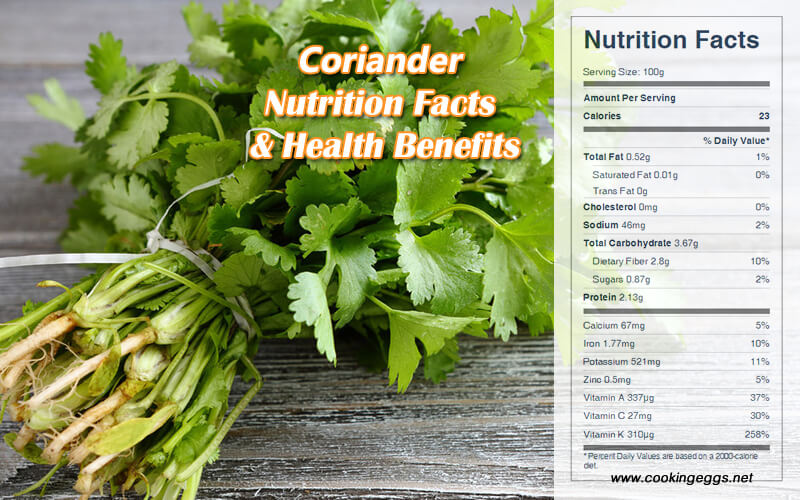Coriander (cilantro) Nutrition Facts & Health Benefits
Coriander is an herb in the family Apiaceae. It is also known as cilantro, particularly in the Americas. It was used as a spice for its seeds and as an herb for the flavour of its leaves.

The nutritional value of coriander
Raw coriander leaves are 92% water, 4% carbohydrates, 2% protein, and less than 1% fat. The nutritional profile of coriander seeds is different from the fresh stems or leaves. In a 100-gram reference amount, leaves are particularly rich in vitamin A, vitamin C, and vitamin K, with a moderate content of dietary minerals. Although seeds generally have lower vitamin content, they do provide significant amounts of dietary fiber, calcium, selenium, iron, magnesium, and manganese.
One-fourth cup of fresh coriander leaf (cilantro) provides 1 calorie, 0.1 g carbohydrate, 0.1 g protein, 0 g fat, 0.1 g dietary fiber, 111 IU vitamin A, 22 mg potassium, and 4 mg calcium.
Raw Coriander Leaves Nutrition Facts Label
Health Benefits of Coriander
Coriander is considered both an herb and a spice. All parts of coriander are edible, but the fresh leaves and the dried seeds are the most commonly used in cooking. Fresh coriander leaves are more commonly known as cilantro; they bear a strong resemblance to Italian flat-leaf parsley.
Coriander seeds are an essential ingredient in curry powders. Powdered coriander seed adds a distinctive North African flavor to meat and fish dishes. In hot, stimulating foods, this mild spice is valued for its cooling quality and its assistance with digestion.
The chopped fresh leaves of the plant that produces coriander seeds, called cilantro, have a delicious, piquant flavor and are good added to a plain green salad. The fresh leaves also go well with cold cooked chicken.
The Egyptians used coriander seeds as an aphrodisiac. Potential medicinal applications Coriander has been used as a folk medicine for the relief of anxiety and insomnia in Iranian folk medicine. Coriander seeds are also used in traditional Indian medicine as a diuretic by boiling equal amounts of coriander seeds and cumin seeds, then cooling and consuming the resulting liquid. In holistic and some traditional medicine, it is used as a carminative and for general digestive aid.
Coriander seeds have a health-supporting reputation that is high on the list of the healing spices. In parts of Europe, coriander has long been referred to as an "anti-diabetic" plant. In parts of India, it has traditionally been used for its anti-inflammatory properties. In the United States, coriander has recently been studied for its cholesterol-lowering effects.
In a study where coriander was added to the diet of diabetic mice, it helped stimulate their secretion of insulin and lower their blood sugar. Another study demonstrated that when given to rats fed a high-fat, high-cholesterol diet, coriander lowered levels of total cholesterol and low-density lipoproteins (LDL), or bad cholesterol, while actually increasing levels of high-density lipoproteins (HDL), or good cholesterol. Research also suggests that the volatile oils found in the leaves of the coriander plant may have antimicrobial properties.
Additionally, coriander juice (mixed with either turmeric powder or mint juice) is used by some as a treatment for acne, applied to the face like a toner.
Health Risk
Coriander can also produce an allergic reaction in some people. Some people are allergic to coriander leaves or seeds, having symptoms similar to those of other food allergies. In one study examining people suspected of food allergies to spices, 32% of pin-prick tests in children and 23% in adults were positive for coriander and other members of the family Apiaceae, including caraway, fennel, and celery. The allergic symptoms may be minor or life-threatening.